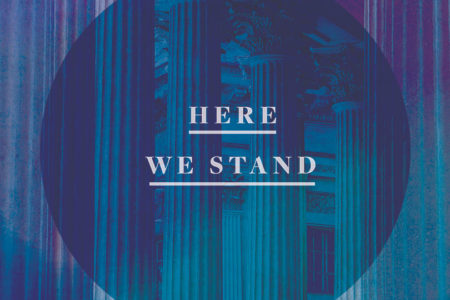Where Was God When…?
It’s often difficult to understand why God doesn’t intervene to prevent terrible tragedies. If you’ve ever found yourself asking, “Where were You, Lord?” you’re in good company.
San Diego State University philosophy professor Peter Atterton has a problem with God, and he was happy to say so in an opinion piece he wrote for The New York Times aptly titled, “A God Problem.” The takeaway from his article is that any rational thinker should be an atheist.
Orthodox Jewish commentator Dennis Prager explains atheism this way: “Life is ultimately a tragic fare if there is no God. We live, we suffer, we die—some horrifically, many prematurely—and there is only oblivion afterward.”1 Prager’s point is exactly why most people are not atheists.
Yet those of us who believe in God often find ourselves struggling with a different problem. That is, where was God when a tragedy occurred that we couldn’t explain, at least to our satisfaction? Where was God in Sri Lanka on Easter Sunday this year when suicide bombers murdered more than 250 innocent people and injured 500 others as they were worshiping in churches or vacationing in hotels? How do we reconcile belief in God and terrible things that happen in life?
Harold Kushner, a well-known American rabbi and author, faced that question when he led his congregation, but more so when his firstborn, Aaron, died in 1977 at the young age of 14 from an incurable genetic disease that prematurely ages its victims. When tragedy struck a family in his synagogue, Kushner would try to help by saying, “We can’t understand why this happened, but we have to believe that somewhere down the road, we’ll see that it made sense.”2 Now his words haunt him. “I wish I could take those words back today,”3 he said during a 2010 National Public Radio (NPR) interview.
His son’s death prompted Rabbi Kushner to write the bestselling book When Bad Things Happen to Good People, which helped him reconcile the tragedy and his rabbinic training about God. “God and I came to an accommodation with each other a couple of decades ago, where he’s gotten used to the things that I’m not capable of and I’ve come to terms with the things he’s not capable of,” Kushner told NPR.4 The “accommodation” Kushner speaks about is his belief that God has limited power but unlimited love. He thinks that message makes people feel better. Somehow, I doubt it.
Three Other Men
The Bible gives us examples of people whose comfort came from knowing God has both unlimited love and unlimited power. The prophet Habakkuk, for example, anguished over the sinful practices his eyes saw. He felt surrounded by evil and strife, much as we do today.
In the midst of his loneliness, frustration, confusion, and depression, he cried out to God: “O LORD,” he said, “how long shall I cry, and You will not hear? Even cry out to You, ‘Violence!’ and You will not save. Why do You show me iniquity, and cause me to see trouble? For plundering and violence are before me; there is strife, and contention arises” (Hab. 1:2–3).
Before David became king of Israel, he was pursued by a crazed King Saul who hunted him like a dog, wanting him dead. In utter despair, David wondered where God was: “How long, O LORD? Will You forget me forever? How long will You hide Your face from me?” he wrote in Psalm 13:1.
Unlike Habakkuk and David, Job did not wonder where God was. Yet unknown to him, he was the focus of a negotiation between God and Satan. Once the negotiation was complete, Job found himself sick, mourning for his dead family, destitute, and alone.
Unlike atheists, Habakkuk, David, and Job all knew God exists. Like Rabbi Kushner, they had difficulty reconciling His seeming lack of engagement in their situations. Yet, unlike the rabbi, they did not believe they could make rules to help themselves feel better. While that sounds harsh, the reality is that we must accept the Scriptures for what they say; we can’t change them. God says, “I AM WHO I AM” (Ex. 3:14). And Scripture teaches God is all-powerful.
In the lives of Habakkuk, David, and Job, God was working to accomplish His purpose while maintaining His love, justice, and holiness. Habakkuk understood and continually trusted God. He could see the purpose in his trouble. Consequently, though his situation did not change, he did. What began with questions at the beginning of the book of Habakkuk ends as a view of God’s glory: “Though the fig tree may not blossom, nor fruit be on the vines; though the labor of the olive may fail, and the fields yield no food; though the flock may be cut off from the fold, and there be no herd in the stalls—yet I will rejoice in the LORD” (Hab. 3:17–18).
David, though oppressed and feeling alone, never stopped trusting in God, realizing his life was in the Almighty’s hands: “I have trusted in Your mercy; my heart shall rejoice in Your salvation. I will sing to the LORD” (Ps. 13:5–6).
Job simply yet painfully testified to the reality of life: “Naked I came from my mother’s womb, and naked shall I return there. The LORD gave, and the LORD has taken away; blessed be the name of the LORD” (Job 1:21).
The God of All Comfort
Tragedy is a fact of life in a sin-filled world, and it can strike any one of us at any moment: a rabbi, prophet, king, or regular guy. It can arrive in the natural form of hurricanes, earthquakes, tsunamis, and floods or through the unnatural acts of perverted, evil, or sick people.
In April a man grabbed a 5-year-old boy and hurled him nearly 40 feet off a third-floor balcony at the Mall of America in Minneapolis, Minnesota, simply because he felt like killing someone that day. That’s what he told authorities.
Years ago, a friend of mine experienced a tragedy in the accidental death of his son Ron. He asked me to conduct the funeral. I knew Ron, who was like the prodigal of Luke 15. He had left home and moved away from his family, his church, and his God. And like the prodigal, he returned. He secured a job and began attending church again. The family was rejoicing, only to have their joy cut short.
I was stunned to hear the news. I stammered when he asked me to officiate. “What do I say? What can I say?” I asked him.
“Steve,” he said calmly, “use the Christian clichés, the ones that comfort, the ones that teach us more about our loving God and Father. I believe them. I believe them all.”
The day of the funeral, I spoke of God’s grace and loving provision. The psalmist said, “Precious in the sight of the LORD is the death of His saints” (Ps. 116:15). The apostle Paul wrote of the “Father of mercies and God of all comfort, who comforts us in all our tribulation, that we may be able to comfort those who are in any trouble, with the comfort with which we ourselves are comforted by God” (2 Cor. 1:3–4).
I spoke of our all-powerful, loving, and holy God, who can have no sin in His presence but who chose to come to Earth to become the final sacrifice for sin and provide the way—the only way—for any of us to have a relationship with Him.
My friend and his family grieved mightily that day and in the days that followed. Yet their grief patterned 1 Thessalonians 4:13: “I do not want you to be ignorant, brethren, concerning those who have fallen asleep, lest you sorrow as others who have no hope.” Their hope rested in the God of all creation who loved them so much He gave His life for them and in whose presence they will someday live forever.
William Barclay, the late, well-known professor of divinity and biblical criticism at the University of Glasgow, said, “The tragedy of life and of the world is not that men do not know God; the tragedy is that, knowing Him, they still insist on going their own way.”
Professor Atterton ended his article speaking of 17th-century French theologian Blaise Pascal, who rejected reason as a basis for faith. Pascal later returned to the Bible. “It is said,” Atterton wrote, “that when Pascal died his servant found sewn into his jacket the words: ‘God of Abraham, God of Isaac, God of Jacob—not of the philosophers and scholars.’”5
Perhaps you are struggling because of a tragedy in your life. You’re feeling pain, sorrow, and deep depression. Take encouragement from the God of Abraham, Isaac, and Jacob; the God of Habakkuk, David, and Job; and yes, the God of my friend who knows the truth in the “clichés” from the Bible. God tells us, “I will never leave you nor forsake you” (Heb. 13:5). We serve an all-mighty, all-knowing God who loves us and walks with us through everything we endure; and we should trust Him no matter what the circumstances because therein lies the secret of true peace.
ENDNOTES
-
- Dennis Prager, “If There Is No God,” Townhall.com, August 19, 2008 <tinyurl.com/y3jo46ls>.
- “Rabbi Kushner: An ‘Accommodation’ With God,” National Public Radio transcription, March 12, 2010 <tinyurl.com/yxcmo9gm>.
- Ibid.
- Ibid.
- Peter Atterton, “A God Problem,” The New York Times, March 25, 2019 <tinyurl.com/y3ttatol>.





Could it be when we are asking, “Why?” that we simply yet profoundly forget that we are the creature of the Creator! God made us from nothing, and having fullest freedom in Himself to do otherwise, created us with affection and loving delight. The Bible answers all our “whys” quite clearly if we remember that we are but dust. Perhaps some grieving is disguised pride, and our complaints and travails take us to where we think too highly of ourselves.
That we feel God is silent or unfeeling – who gave us feelings? If we feel confused or vulnerable, didn’t God place those feelings in us? If not, then who did?
Sorrow and tragedy, abasement and shame may come, yet God’s firsthand experience of these events and emotions are fully explained through Christ’s humiliations.
Oh that we would quiet our souls and questions with greater knowledge and of the shame he so despised. These common experiences
The Lord approached his crucifixion not as a helpless creature, but as a humble creator, endured the cross while despising the shame, and He who knew no sin suffered the ultimate weight it and the ultimate wrath for it.
Yet, himself any latitude in his dealings toward us. That he allowed Adam and Eve to believe otherwise, to allow them to rebel against this
What a joy it is to stumble upon
IsraelMyGlory on my computer.
I still cherish my magazine.
It is simply the TRUTH! It gets no better than that.
Thank You.
Bruce and Betty Holmes